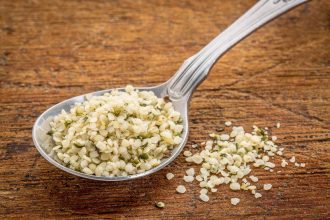By Sayer Ji
Contributing writer for Wake Up World
Hemp seeds are gaining increased recognition as a delicious and nutritious food, but few still know they have significant medicinal value as well…
One of the most potent medicinal foods on the planet is the seed of the cannabis sativa plant, which has a documented history of use in in the Chinese pharmacopeia that goes back to 2727 B.C., and archeological evidence indicating it was likely used as far back as 12,000 B.C.1
A study published in the Journal of Agricultural and Food Chemistry summarized its nutritional properties as follows:
Hemp seed has high levels of fatty acids, protein, insoluble fiber, and a rich set of minerals and vitamins. It is considered to be perfectly balanced with regard to the ratio (3:1) of two essential polyunsaturated fatty acids (PUFAs) for human nutrition, linoleic (omega-6) and alpha-linolenic acids (ALA) (omega-3).”
The study also summarized the growing body of research in existence that demonstrates their medicinal properties:
“In addition to its nutritional value, hemp seed demonstrated positive health benefits, including alleviating constipation, lowering cholesterol, cardiovascular health benefits, immunomodulatory effects, and dermatological disease amelioration effects. Hemp seed extracts showed also strong antioxidant and anti-aging effects and the potential to improve the impaired learning and memory induced by chemical drugs in mice.”
Titled, “Characterization of Lignanamides from Hemp (Cannabis sativa L.) Seed and Their Antioxidant and Acetylcholinesterase Inhibitory Activities,” the study explored the hitherto unexamined presence of secondary metabolites of hemp seed in order to identify bioactive compounds that could help explain both their observed and purported health benefits.
The investigation led to the isolation of 4 new phytochemicals known as lignanamides, namely, cannabisin M (2), cannabisin N (5), cannabisin O (8), and 3,3′-demethyl-heliotropamide (10), along with 6 other liganamides which were already known about within the scientific community. These liganamides were tested in cell studies (in vitro) and exhibited two properties of potential therapeutic relevance:
- Antioxidant properties: Lignanamides, 2, 7, and 9-14
- Acetylcholinesterase inhibiting properties: 7, 10, and 13.
The beneficial role of antioxidants will already be clear to most readers. Antioxidants, of course, have a broad range of therapeutic properties, from reducing accelerated aging to reducing the risk of DNA damage linked to cancer. But what do acetylcholinesterase inhibitors do? One of the most well known functions of acetylcholinesterase inhibitors are to reduce the activity of enzyme that degrade the neurotransmitter acetylcholine, adequate quantities of which are necessary for the optimal functioning of our memory. There are, in fact, an entire class of Alzheimer’s drugs whose purported mechanism of action is to inhibit the acetylcholinesterase enzyme. These, however, have a broad range of side effects, making natural modulators of this enzyme all the more desirable. To this point the researchers concluded their study:
“The bioassay results of the current study suggest that hemp seed, with lignanamides as nutrients, may be exploited for their bioactive potential, because compounds with both antioxidant and acetylcholinesterase inhibitory activities are good choices for multitarget anti-Alzheimer’s disease candidates.”
Another function of acetylcholinesterase inhibitors relevant to Alzheimer’s disease is their hypothesized ability to both mitigate and potentially reverse the distinctive pathological protein folding patterns or “plaque” known as amyloid beta. This so-called non-classical, non-cholinergic function has also been witnessed for another component of cannabis, the pyschoactive cannabinoid THC, which was found several years ago to have significant anti-Alzheimer’s properties. One of the mechanisms identified for THC’s therapeutic role was its ability to prevent acetylocholinesterase-induced beta amyloid plaque aggregation. You can learn more by reading the articles, Marijuana Compound Found Superior To Drugs For Alzheimer’s and The Chemistry of a Cannabis High – How THC’s Psychoactive Properties Protect the Brain
- To learn more about the health benefits of hemp seed, visit Hemp Seed Benefits.
- To evaluate the research on the varied health benefits of the cannabis plant as a whole, visit: Cannabis Health Benefits.
- To learn more about natural approaches to Alzheimer’s disease, visit: Natural Alzheimer’s Disease Research.
Additional reference:
About the author:
Sayer Ji is the founder of GreenMedInfo.com – an open access, evidence-based resource supporting natural and integrative modalities. He is on the Board of Governors for the National Health Federation and Fearless Parent, a Steering Committee Member of the Global GMO-Free Coalition (GGFC), a reviewer at the International Journal of Human Nutrition and Functional Medicine. Since 2003, Sayer has also served as a patient advocate and an educator and consultant for the natural health and wellness field.
For more, visit GreenMedInfo.com and Facebook/GreenMedInfo, or sign up for GreenMedInfo’s free e-Newsletter.
Recommended articles by Sayer Ji:
- Acupuncture Beats Injected Morphine for Pain: Groundbreaking Study
- Group Drumming Better Than Prozac, Study Suggests
- Mammography Is Harmful and Should Be Abandoned, Scientific Review Concludes
- “Killer Germs” Obliterated by Medicinal Smoke Smudging, Study Reveals
- 6 Evidence-Based Ways Drumming Heals Body, Mind and Soul
- Coconut Water: A New Alzheimer’s Disease Treatment?
- Turmeric’s ‘Smart Kill’ Properties Put Chemo & Radiation To Shame
- Tylenol Kills Emotions As Well As Pain, Study Reveals
- Beet Juice Boosts Cognitive Function In One Dose
- 13 Evidence-Based Medicinal Properties of Coconut Oil
- 25 Cancer Stem-Cell Killing Foods That Are Smarter Than Chemo and Radiation
- Roundup Weed Killer (Glyphosate) Threatens Coral Reefs, Persists In Seawater

If you've found value in our articles, we invite you to support the release of our brand-new book, "Gratitude Practices for Kids: A Practical Guide for Adults to Instill a Spirit of Appreciation and Positivity in the Next Generation."
"Gratitude Practices for Kids" brings together over 25 innovative and accessible practices designed to enhance gratitude in everyday life. This comprehensive guide is backed by 17 scientific studies, ensuring each concept is grounded in research, underscoring our commitment to nurturing growth, emotional intelligence, and positive interactions between adults and children.
We encourage you to opt for the paperback version to celebrate this new release. Dive into its fresh pages away from digital distractions, allowing you to immerse yourself in the transformative practices it offers.
Over recent years, Wake Up World has faced significant online censorship, which has impacted our financial ability to operate. Moving into book publishing represents a strategic step to secure the ongoing funds needed to continue our mission. By purchasing Gratitude for Kids, you help us keep our content free and accessible to everyone, avoiding needing a paywall. With over 8,500 articles published in the last 13 years, we remain dedicated to keeping our valuable content open to all.









